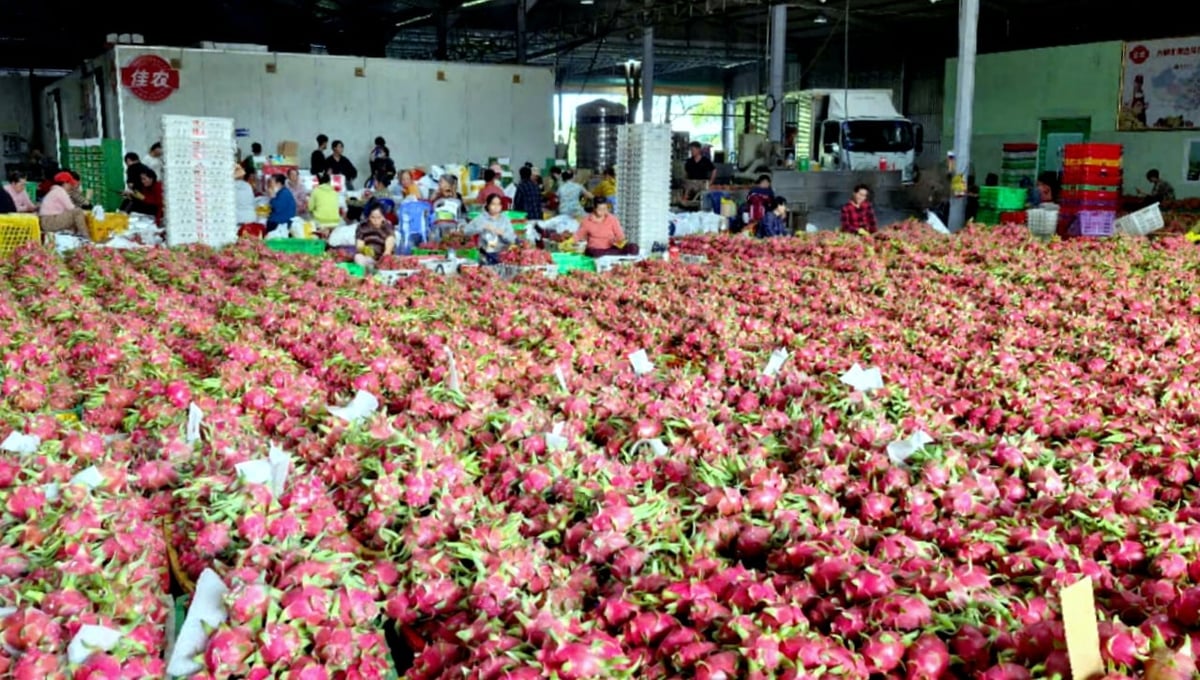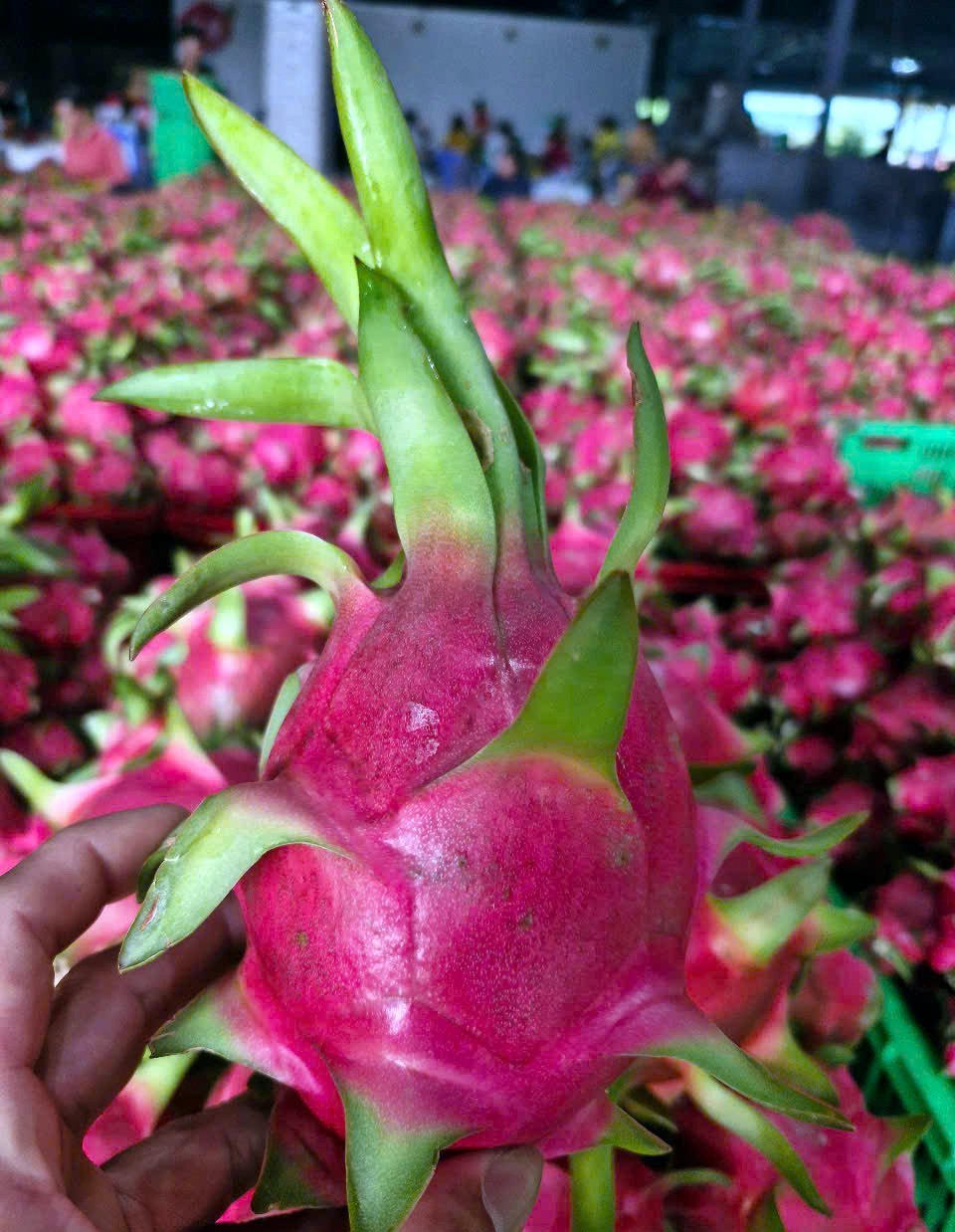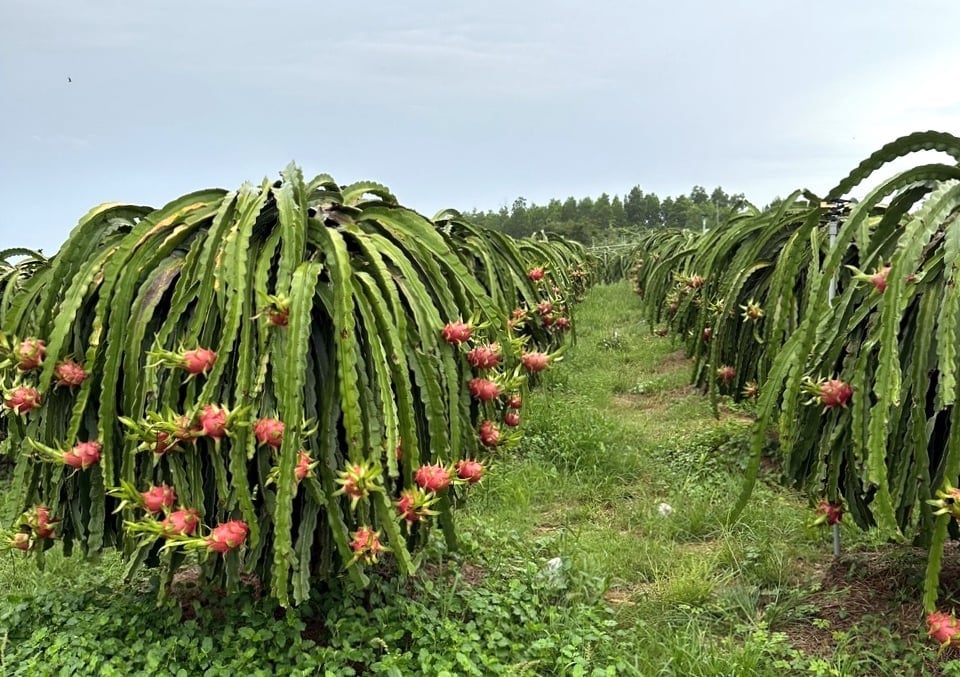November 26, 2025 | 06:07 GMT +7
November 26, 2025 | 06:07 GMT +7
Hotline: 0913.378.918
November 26, 2025 | 06:07 GMT +7
Hotline: 0913.378.918

In recent times, the market has shown positive signs, and dragon fruit exports in Lam Dong Province have grown significantly. Photo: Kim So.
According to Mr. Nguyen Van Khanh, Deputy Director of Lam Dong Department of Industry and Trade, the official export turnover of dragon fruit by enterprises in the province reached USD 6.81 million in the first half of 2025, equivalent to 6,357 tons of fresh dragon fruit. This figure shows a remarkable increase compared to the same period in 2024, with value up 30.38% and volume up 25.78%. Lam Dong’s official dragon fruit exports are concentrated in key markets such as China, South Korea, India, the UAE, Australia, New Zealand, and the Russian Federation.
In addition, exports through the Vietnam–China border gates by road also remained stable and vibrant. According to data compiled from northern border provinces, in the first 7 months of 2025, dragon fruit exported through these border gates reached about 485,000 tons, most of which came from Lam Dong.
Mr. Khanh said the results were achieved thanks to multiple factors. Alongside the close guidance of the Provincial Party Committee and People’s Committee, relevant departments, sectors, and localities promptly resolved difficulties in production and business activities.
The Department of Industry and Trade also effectively implemented support solutions, trade promotion, and product distribution linkages. At the same time, enterprises' dynamism in participating in fairs and exhibitions and exploring new markets was also a key factor in sustaining growth momentum.

Lam Dong Province is known as the capital of dragon fruit production. Photo: Kim So.
Despite positive signals, dragon fruit exports still face many challenges. From now until the end of the year, the Lam Dong Department of Industry and Trade forecasts that China will remain the largest consumer market for Vietnamese agricultural products in general and Lam Dong’s dragon fruit in particular.
However, according to Mr. Nguyen Van Khanh, the Chinese market is no longer as “easygoing” as before. China is increasingly applying stricter standards regarding origin traceability, labeling, and quarantine regulations.
In addition, importers in other markets such as the US and EU are also introducing increasingly strict regulations on food safety and tightening checks on pesticide residues, creating major challenges for Lam Dong’s agricultural exports.
To cope with these challenges and ensure smooth dragon fruit consumption, he believes a change in food safety approach is needed, shifting from only checking the final product to supervising every stage of the production chain. Moreover, it is necessary to invest in producing high-quality products, specialties, geographical indication products, and organic products.
One of the most important recommendations is that businesses and farmers must strengthen input quality management throughout the process of cultivation, intensive farming, care, harvesting, preliminary processing, and export packaging. Strict compliance with regulations on the management of planting area codes and packing facilities is essential to ensure quality and food safety.

Farmers need to improve product quality to meet the requirements of all markets. Photo: Kim So.
Regarding the recovery of dragon fruit exports in the coming period, the Lam Dong Department of Industry and Trade will implement several key measures.
Accordingly, the Department will continue coordinating with the Departments of Industry and Trade of northern border provinces to grasp and update information in a timely manner on mechanisms, policies, and trading activities at border gates with China. This aims to help enterprises develop effective production plans and regulate shipment volumes to border gates in line with clearance capacity. At the same time, the Department will continue implementing Plan No.3049/KH-UBND dated August 18, 2021, on developing and expanding dragon fruit consumption markets in the province for the period 2021–2025.
In addition, the Department of Industry and Trade will support enterprises and cooperatives to participate in cooperation, linkage, and trade connection programs with enterprises in other provinces to promote branding and establish distribution channels in wholesale markets, supermarkets, and traditional markets across the country.
Finally, the Department of Industry and Trade will support enterprises in enhancing production capacity, increasing competitiveness, and meeting international standards, aiming at the goal of exporting OCOP products from dragon fruit that have been certified with 3–4 stars. Along with that, the Department will coordinate with e-commerce platforms to support enterprises in connecting with foreign importers and supply chains both domestically and internationally.
Encouraging and supporting enterprises to invest in technology and equipment to process high-quality products that ensure food safety is also a priority to meet market requirements and reduce the pressure on fresh dragon fruit consumption.
Translated by Huong Giang

(VAN) An Giang promotes supply-demand connections, standardizes quality and builds value chains, creating a foundation for sustainable bird’s nest development and aiming to expand exports.
/2025/11/24/5339-4-nongnghiep-075331.jpg)
(VAN) Recently, the conference on 'Sustainable Fisheries Linkage Chain - Tilapia for Export' took place in Tien Hai commune, Hung Yen province.
/2025/11/21/4309-2-153400_128.jpg)
(VAN) Green and low-emission rice is paving the way for Vietnamese rice to enter high-end markets, marking the beginning of a transformation journey toward greening and elevating the national rice brand.

(VAN) ‘Right to Win’ outlines a national action plan that shapes a new vision for Viet Nam’s agriculture in an era of renewal and global integration.

(VAN) Lam Dong’s farmed sturgeon output this year is expected to reach 2,300 tons, worth VND 450 billion, affirming the brand’s position on the market.

(VAN) A surge in Ukrainian egg exports, largely driven by soaring sales to the UK over the last few years, has notably pushed up egg prices on the domestic market.

(VAN) The price of Arabica Catimor coffee in Quang Tri is currently at VND 25,000–27,000/kg (fresh cherries), the highest level ever recorded